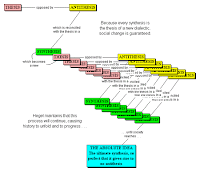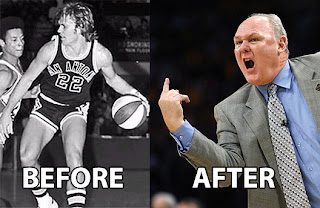Inside Man: Some Thoughts on Spike Lee's "He Got Game" (1998)
Thursday, December 30, 2010
Considering that I am going to be teaching this stuff, it was about time that I finally filled the gap and saw Spike Lee’s 1998 “He Got Game.” While I was occasionally bored or disappointed, I did care enough to watch the whole thing through (not a given for me), and (after a helpful conversation with Claire) I ultimately felt like I expect I might have had I stumbled upon a Brecht play: good message if somewhat heavy handed, cleverly aware of its own medium, and certain moments of aesthetic genius.
If you're looking for ambiguity, this is not the film for you. "He Got Game" unambiguously states the case that in the ever-increasingly high stakes game of finding the second-coming of the transcendent superstar who will win games, fill seats, and sell shoes, the gifted urban adolescent athlete is pure of heart, clear of head and surrounded by scummy parasitic schemers and criminals offering cash, gifts, and women in exchange for a commitment that the young star, will turn pro or sign with their college program. In "He Got Game," Jesus Shuttlesworth, the nation's number one prospect (played pretty convincingly by a young Ray Allen) turns it all down, except for one bizarre lapse where he hooks-up with a couple of pretty gross white prostitutes procured for him by the staff at "Tech U."
I applaud Lee for painting the scene in this way. Though both the goodness of Jesus and the badness of the coaches, agents, and hangers-on feel exaggerated to the point of inexplicable implausibility, this is an appropriate corrective to the somehow still prevailing myth that the young (usually African-American) superstar athlete is morally confused at best (on account of a perilous upbringing) and the (usually white) fixers, scouts, middle-men, agents, and coaches who surround him -- apart from a few opportunistic bad apples -- are just trying "to do what's best for the kids and the game goshdarnit."
Lee reminds us -- and we seem to require it no matter how many books like George Dohrman's Play their Hearts Out or Darcy Frey's The Last Shot, or documentaries like "Hoop Dreams" (and Lee offers a nod to the latter, whose two stars Arthur Agee and William Gates make cameos in the opening credits), come out -- that if you love the game, and Spike definitely loves the game, these are some of the conditions of possibility for what you love. It goes with the territory. Sort of the way that Morgan Spurlock's "Super Size Me" reminded me of what goes into my Big Mac. If I have to choose my basketball propaganda film: I'll take this vision over "Hoosiers"'s nostalgic fantasy of the time we scrappy little white folks pulled it together and through effort and the superior evolutionary leap called teamwork beat that team of frighteningly athletic but hopelessly individualistic Blacks.
Anyway, propaganda aside, "Super Size Me" made me hungry for McDonald's. And He Got Game made me hungry for more game, especially Ray Allen's work-of-art jump shot. But I think for subtly different reasons that have to do with what makes Spike Lee more than a superb (and much needed) propagandist. Super Size me didn't make me want McDonald's because it's images of the food were enticing, or because Spurlock told a narrative that I could relate to. I think it made me want the food because the food is made to be addictive and so almost any mention of it reminds my body that I want it. He Got Game made me want more basketball because when Lee wasn't talking with his voice, but just with his eyes and camera he created tableaus and fragments of narrative into which I could project myself.
So this is genius:
Aaron Copland's score connotes nothing more than the innocent expansive landscape of rural America where individuals with pluck and determination carve each their own modest path and the sum of all those modest paths, the sum of those small triumphs is the greatness of the country as a whole, registered in the crescendos. Lee gives us what the music leads us to expect -- the farm boy playing ball in the dirt driveway a stone's throw from golden fields -- but then gives us more to boot: the middle-aged black men shooting and hanging around an urban playground, two girls executing a perfect give-and-go, a young African-American boy working on his cross in an abandoned lot. All of it tied together with the fabric of Copland's score: do you get the picture yet? he's painting you a portrait of America.
Lee also gets the beauty of the ball in motion, say, on its arc toward the basket: he understands and communicates with his camera far better than I ever could in words the possibility, perfection, and power in that path. He gets and transmits effectively the combination of grace, beauty and force in the basketball player in improvisational motion.
When he shows me, in the clip above, or in the opening credits, just a fragment of a shot in the air, or the beginnings of a move toward the hoop, I can fill in the rest with the memories and fantasies of my own lifetime.
Lee also taps into a particular narrative that, while obviously not strictly speaking universal, certainly works for me: the story of the love and hatred, the collaboration and rivalry that is the relationship between father and son. My dad never pushed me the way that Jake pushes young Jesus in the film's flashbacks, relentlessly baiting him with trash-talk, swatting his every shot attempt, and even knocking him to the ground. But I still felt pushed to tears and desperate rage and moments of excellence by something that I attributed to my father. And so also the fantasy of Jesus, now grown, dominating his father and turning the physical and psychological tables in a final game of one on one, appeals in equal measure.
My own relationship with my dad has certainly evolved over the decades. I now deeply appreciate what he has taught me. I love what he is that I am, for better and for worse, and what he is that, for better and for worse, I will never be. But whatever is unresolved in my relationship to my dad, I am certain, would be resolved once and for all if we could play one game of one on one, under the floodlights. But it would have to have these three elements: 1) me swatting his shot and saying "get that shit outta here" 2) me saying "What you want? Jump shot, dunk?" and, most of all, 3) him relentlessly talking trash -- "I think I'l go around again", "I'm teaching, like I always been teaching" -- even in the face of the overwhelmingly obvious reality that I'm now the better player.





































